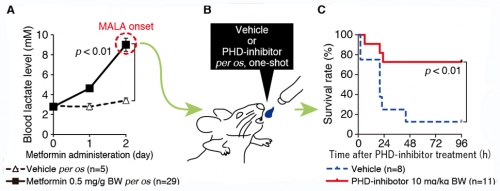研究成果 Research Results
- TOP
- News
- Research Results
- New therapeutic strategy for metformin-associated lactic acidosis (MALA) - Targeting oxygen sensor PHD for lactic acidosis treatment -
New therapeutic strategy for metformin-associated lactic acidosis (MALA) - Targeting oxygen sensor PHD for lactic acidosis treatment -
2017.06.30Research ResultsLife & Health
Metformin is one of the most widely used therapeutics for type 2 diabetes mellitus and also has anti-cancer and anti-aging properties. However, it is known to induce metformin-associated lactic acidosis (MALA), a severe medical condition with poor prognosis, especially in individuals with renal dysfunction. Inhibition of oxygen sensing prolyl hydroxylase (PHD) is known to activate transcription factor HIF (hypoxia-inducible factor) that increases lactate efflux as a result of enhanced glycolysis, but it also enhances gluconeogenesis from lactate in the liver that contributes to reducing circulating lactate levels. Here the research group of Kyushu University, Keio University School of Medicine and Daiichi Sankyo Co., Ltd. investigated the outcome of pharmaceutical inhibition of PHD in mice with MALA induced through the administration of metformin per os and an intraperitoneal injection of lactic acid. We found that the PHD inhibitors significantly increased the expression levels of genes involved in gluconeogenesis in the liver and the kidney, and significantly improved the survival of mice with MALA. Furthermore, the PHD inhibitor also improved the survival rate of MALA aroused on chronic kidney disease (CKD) mice. Thus, PHD represents a new therapeutic target for MALA, which is a critical complication of metformin therapy.
For more information, see http://dx.doi.org/10.1128/MCB.00248-17
Toramaru–Oyaizu T, et al.: “Targeting oxygen sensing prolyl hydroxylase (PHD) for metformin-associated lactic acidosis treatment” Molecular and Cellular Biology
doi:10.1128/MCB.00248-17

Figure A: Mice model for renal dysfunction induced by 0.2% adenine diet were administered with either Vehicle of 0.5 mg/g BW of Metformin. Blood lactate level were significantly increased (MALA onset) on day 2.
Figure B: MALA mice were treated with either Vehicle or 10mg/Kg BW of OHD-inhibitor.
Figure C: Kaplan-Meier survival analysis showed significant improvement of survival rate in PHD-inhibitor treated group.
Journal Reference
Targeting oxygen sensing prolyl hydroxylase (PHD) for metformin-associated lactic acidosis treatment, ,Molecular and Cellular Biology, 10.1128/MCB.00248-17Research-related inquiries
- TOP
- News
- Research Results
- New therapeutic strategy for metformin-associated lactic acidosis (MALA) - Targeting oxygen sensor PHD for lactic acidosis treatment -































